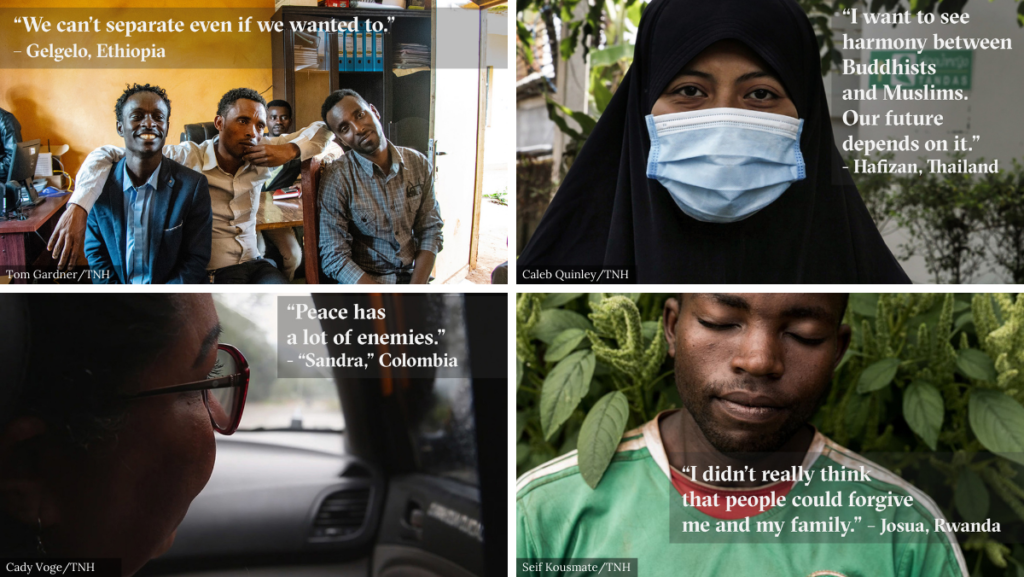Mass Violence and Atrocities
Beyond the Bang-Bang: Reporting from the Front Lines of Peace
Independent, non-profit newsroom The New Humanitarian and the Stanley Center partner to explore what makes societies resilient to conflict and mass violence.
Conflict and violence often make headlines. But focusing attention on the “bang-bang” can create an impression that violence is somehow inevitable. While reporting just before and during a crisis is critical to helping people understand conflict dynamics and ways to prevent escalation to mass violence or atrocities, there are many overlooked stories—outside of the epicenter of crisis—from the front lines of peace.
What do those stories look like? And how can they help expand, deepen, and improve policy conversations that aim to support and sustain peace?
The Stanley Center teamed up with the Geneva-based non-profit newsroom The New Humanitarian (TNH) to tackle these questions.
On September 21, the UN International Day of Peace, TNH and the Stanley Center announced a partnership to explore what makes societies resilient to conflict and mass violence.
We’re launching a new stream of reporting, in partnership with @StanleyConnect, from the front lines of peace. We’ll report on how atrocities can be prevented, how societies can be made more resilient, and how peace can be sustainably built. https://t.co/qcVWGH7KAE
— The New Humanitarian (@newhumanitarian) September 21, 2020
As part of a new stream of reporting from the front lines of peace, TNH’s independent journalism examines questions such as:
- What makes societies resilient to violent conflict?
- What makes prevention and peacebuilding efforts succeed or fail?
- How can societies be strengthened from the inside, giving agency to those in affected contexts?
Through a combination of on-the-ground reporting from TNH and timely policy dialogue and debate led by the Stanley Center, this partnership presents fresh perspectives on how to prevent and reduce violence and conflict around the world while fostering the conditions for peace. Coverage is global and focuses on these broad themes:
- Resilience: managing fragility to transform conflict into opportunities for peace.
- Mediation: the art of a positive deal, creating inclusive and broad-based peace.
- Reconciliation: building tolerance and helping people overcome the wounds of conflict.
- Women in peace and security: turning a gender lens on issues of inclusion and sustainable peace.
COVID-19 is also a recurring sub-theme of reporting, as the pandemic has added a new, unclear dimension to both conflict and peace.
ICYMI, @newhumanitarian Senior Editor @Enugu62 discussed the “Reporting from the front lines of peace” project during this #GPW20 event on rebuilding trust in fragile societies & improving access to reliable information.
Learn more about this new series:https://t.co/JEYgbKC5zf https://t.co/SKccMwEvOu
— Stanley Center for Peace and Security (@StanleyConnect) November 2, 2020
Founded just after the Rwandan genocide—when the world failed to prevent the massacre of nearly 800,000 people—TNH is an independent newsroom that has been reporting for 25 years from the heart of crises around the world. Coverage often focuses on large-scale systematic violence and cycles of conflict, fragility, and crisis that leave so many lives vulnerable to suffering and death. Working with local correspondents in dozens of countries, and with analysts and editors with intimate knowledge of the humanitarian sector, TNH brings a unique vantage point to the partnership with the Stanley Center to investigate “what works” to prevent these crises from occurring.
TNH’s original reporting will be independently produced through the end of 2021 and will be housed on their new in-depth page, along with previous TNH peace reporting, the archives of Peacebuilding Deeply, and other features, such as photo essays and a “War and Peace defined” pop-out explaining terms across the spectrum of conflict and peace that may appear in TNH’s coverage. Taken together, TNH and the Stanley Center envision the in-depth page for Reporting from the Front Lines of Peace to become a unique space for a range of rich original reporting on peace-related themes, with articles, analyses, insights, talks, and background information examining the attitudes, institutions, and power structures within societies that can build or threaten peace.
Would you like to follow this reporting as it unfolds?
Sign Up for TNH’s Peacebuilding Newsletter

